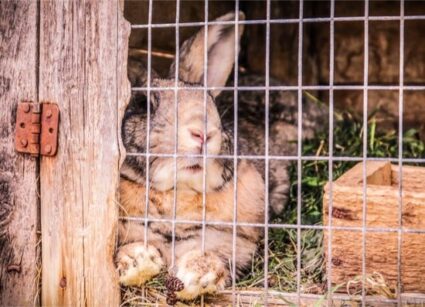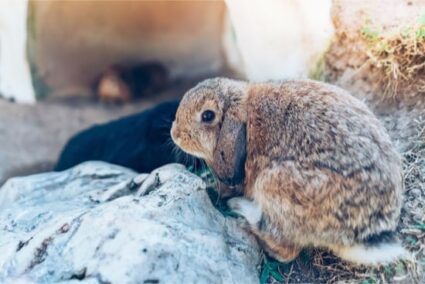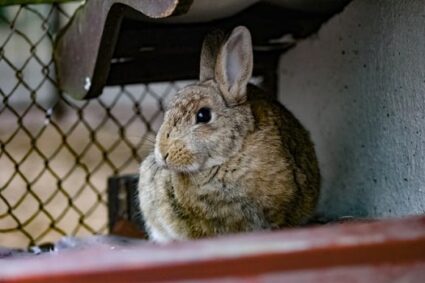Pet rabbits have a friendly, happy, and sociable nature. But bunnies can also experience sadness and negative emotions. Rabbits can become depressed if their environment isn’t right, or if they’re sick or stressed.
Unhappy rabbits often seem lethargic and unmotivated. They may sleep more than usual, or hide for hours on end. They may seem reluctant to eat, even when offered their favorite foods. They may show no interest in socialization or exercise. You should also look out for destructive behaviors, such as fur pulling and excessive biting.
We’ll help you recognize the signs of depression before exploring the triggers. We’ll also share tips on how to cheer up a depressed rabbit.
Do Rabbits Get Depressed?
Rabbits are more intelligent than most people realize. They are sentient beings that can experience a wide range of emotions, both positive and negative. They can also detect negative human emotions.
If you provide the correct care for your bunny, it’ll have a happy life and live for a long time. However, rabbits can become depressed if they experience trauma, or if something’s wrong with their environment.
Pet bunnies need more than a hutch, food, and water. To be happy, rabbits require social interaction, mental stimulation, and physical exercise. They also bond strongly with other rabbits and their caregivers, and can become sad if separated from them.
Rabbits can also experience stress and anxiety. If there’s something wrong in their environment, stress can occur together with depression. This can cause them to avoid exercise and eat less than they should. This can cause rabbits to develop health problems, and even die.
Veterinarians can’t do much for rabbits with depression. There aren’t any medications or therapies for sad rabbits. So, it’s up to you to recognize the signs that your rabbit is miserable and make the right adjustments.
How Can You Tell When a Rabbit is Sad?
Rabbits don’t speak the same language as humans, so they can’t tell us when something is wrong. The symptoms of depression in rabbits can be subtle and easy to miss if you’re not paying close attention.
Lethargy
Rabbits are energetic animals that love running around and playing, particularly in the morning and evening. Rabbits with depression are often listless and inactive, showing little motivation to play.
Hiding
Sad and stressed rabbits usually prefer to hide away from the world. They may hide for hours in their bed, or somewhere secluded and covered.
Asociality
Rabbits are ordinarily social creatures that love interacting with other rabbits and humans. If your rabbit is showing no interest in social interaction, it may be depressed.
Lack of appetite
Bunnies usually spend a significant portion of their day eating hay. Depressed rabbits can have smaller appetites, and may not get excited when offered treats, such as blueberries.
Pacing
Pacing around in a small space can be a sure sign of stress, anxiety, and depression.
Biting
Rabbits love to chew and nibble, to keep their teeth filed down. However, rabbits with depression often spend excessive amounts of time biting things obsessively. This could be the bars of their cage, for example.
Overgrooming
Rabbits groom themselves to keep themselves clean. However, if they are grooming so much that bald spots appear, they may be stressed or sad.
Posture
A sad rabbit will sit hunched up most of the time, with its eyes half-closed. It won’t often stretch their legs out and relax.
Each rabbit is different. Your rabbit may display all of the above signs, or only a few of them. Any change in its normal behavior and temperament should be noted.

Why Is My Rabbit Depressed?
If your rabbit seems sad, it’s time to figure out the underlying issue. Rabbits don’t develop depression for no reason. There’s almost always a problem which is triggering it. You won’t be able to alleviate your rabbit’s sadness unless you know what the cause is. Depression in rabbits is usually caused by one of the following things:
- Rabbits bond strongly with other rabbits and their human owners. If a rabbit loses its companion, it will grieve for a long time.
- When a rabbit experiences perpetual stress, this can take a toll on its mental health. Changes in routine, such as moving house, can cause stress. Being cooped up in a cage that is too small is a problem.
- Sickness and injury can often trigger depression in pet rabbits. Pain and malaise can make rabbits reluctant to move, eat, or play.
- Rabbits have an innate need for social interaction. Pet bunnies kept alone can often become lonely without another rabbit for company. This is likely if their owner doesn’t spend much time with them.
- Bunnies are intelligent and require regular mental stimulation. If there aren’t enough things for them to do, they can become bored. Over time, this can lead to depression.
If your rabbit is depressed all of a sudden, it’s usually easy to identify what’s changed in its life. However, it often comes on gradually, with no clear-cut cause. Below, we’ll explain in more detail about some of the most common causes of depression in rabbits.
Rabbit Depressed After Death
As rabbits are social animals, they form strong bonds with other rabbits. They can even bond with other animals, such as guinea pigs and cats. A companion provides valuable social interaction and company for a rabbit. So, when their companion dies, it can harm its mental health.
You can’t explain to your rabbit why its friend has suddenly disappeared. For several days, you may notice your rabbit searching everywhere for its missing buddy. When they realize they’re not coming back, it’s common for a rabbit to feel miserable.
If this has happened to your rabbit, you need to let them grieve. It can help to shower your pet with lots of extra love and attention until it’s feeling better again. Offer your rabbit lots of tasty veggies to help improve its appetite, although you should be careful not to overfeed.
The best long-term solution is to get your rabbit a new friend. Introducing a new bunny to bond with can perk up a grieving rabbit. Contact a shelter near you to see if they have any suitable rabbits for adoption.
Rabbit Depressed After Spay or Neutering
It’s normal for a rabbit to seem depressed or not itself after being spayed or neutered. After all, both procedures are operations. Their sex organs are removed, and along with it, a major hormone change takes place.
If your rabbit seems depressed after neutering, it’s probably not a cause for concern. Lethargy and lack of appetite are normal after surgery. It’ll likely prefer to stay still and avoid excessive movement.
It may also be in some pain while the wound heals. Pain medication will help, but it may cause your rabbit to feel strange, affecting its behavior.
Your rabbit’s wound will have healed entirely within 2 weeks. However, it takes several weeks for the last of the hormones to leave the body. Until this point, your rabbit’s personality may seem subdued.
Seasonal Depression in Rabbits
If your rabbit seems miserable in the winter, it’s possible that it has seasonal depression. This is a form of depression that takes hold when rabbits are not exposed to much natural light.
In humans, seasonal depression is triggered by a lack of serotonin, according to Depression Research and Treatment. Serotonin is the “happy chemical” that regulates our moods. Though seasonal depression hasn’t been scientifically researched in rabbits yet, it likely acts in the same way.
If this is the case for your rabbit, you may notice its behavior starts to change in the fall. They may begin to act sad or listless, and may not return to its old self until the Spring.

This can also tie in with a rabbit’s molting cycle. Rabbits go through a big shed around twice per year, coinciding with the changing seasons. It takes a month for a rabbit to shed all their fur. During this time, they can become more reclusive, groom extensively, and seem miserable overall.
To help your rabbit through their seasonal depression, give it lots of attention and things to do. Brush your rabbit every day when molting to help rid them of any loose fur and prevent hairballs.
Installing a special light that mimics the natural color of the sun’s rays can also help. Talk it through with your veterinarian beforehand.
Loneliness and Boredom in Rabbits
Rabbit boredom and loneliness are the most common causes of depression in pet bunnies. Many owners aren’t aware of just how much attention and stimulation bunnies require. You may be neglecting your rabbit’s needs without even knowing it.
Because they are social animals, rabbits need social interaction to be happy. The ideal companion for a rabbit is another rabbit. They’ll keep each other company all day long. Without any company, rabbits can become depressed.
If you only have one bunny, you’ll need to personally play with them for at least two hours per day. During this time, give your rabbit undivided attention. Sit or lay on the floor with your rabbit, hand-feed and pet them. You can even try teaching them tricks using a clicker. This will help provide it with mental stimulation.
You should house your rabbit in a pen or run that is large enough for it to run around. Rabbits need at least 32 square feet of space. As well as this, they also require toys and activities to keep them occupied.
How to Cheer Up a Depressed Rabbit
If you aren’t sure why your rabbit is depressed, you should first take them to a veterinarian for a checkup.
Pain and discomfort can masquerade as symptoms of depression in rabbits. Listlessness, hiding, aggression, and loss of appetite could all be signs of an undiagnosed illness. Because rabbits are prey animals, they naturally try to hide their pain to avoid looking weak to predators.
If your veterinarian can’t find anything wrong, it is most likely a loneliness or boredom issue. These are the leading causes of depression in bunnies. Rabbits are clever animals, and can become depressed quickly if they are under-stimulated. Here are some ideas for how to cheer up a sad rabbit:
- Get a second rabbit. Rabbits are social animals and should never be housed alone. Two rabbits can play together, groom one another, and provide valuable company.
- Spend more time interacting with your rabbit. If you only have one rabbit, you should spend at least 2 hours each day playing with it.
- Give your rabbit more space. Most hutches and cages sold at pet shops are too small for a rabbit to live in. Rabbits can become depressed if they are cooped up. They need access to a 32-square-feet enclosure for at least 3 hours per day.
- Vary your rabbit’s surroundings. Take your rabbit to a different room to allow it to explore the new smells. Offer them different foods to keep things fresh.
- Give your rabbit more to do. Sitting in an empty room with nothing but food and water would be depressing for any rabbit. Ensure your rabbit has plenty of activities and toys to keep it entertained.
Enrichment Ideas for Rabbits
Mental and physical stimulation is vital to keep a rabbit happy and healthy. The more things you give your rabbit to do, the happier it’ll be. Here are some examples:
- Planters filled with earth or shredded newspaper. Rabbits love to dig, as they would naturally burrow in the wild.
- Balls made from wicker that they can chase around and chew on.
- Cardboard boxes. Rabbits love to dive inside and climb on top of them. As a bonus, they’re great for chewing on.
- Treat puzzles. These are toys that you can hide treats inside. The rabbit has to use logic to figure out how to get to the treat.
- Treasure hunts. Rabbits have an excellent sense of smell. Hide tasty treats such as raisins, and your rabbit will enjoy foraging for them.
- Things to jump on, such as stools. Maximize your rabbit’s vertical space as well as horizontal. They love to get high up.
- Homemade hay feeders. Stuff hay tightly inside toilet roll tubes, for example. Your rabbit will enjoy pulling it all out.
Every day, rotate the toys and activities that you offer your rabbit. This will help prevent your rabbit from becoming bored with its surroundings.
You can even switch up your rabbit’s food by offering it different vegetables. Introduce new foods slowly and one-at-a-time, and avoid overfeeding. Allow your rabbit unlimited access to water and grass hay.
Why is My Unhappy Rabbit Not Eating?
It’s common for rabbits to eat less when they’re depressed. Unhappy rabbits can lose interest in all of their favorite activities, including eating food.
Usually, a depressed rabbit’s appetite can be stimulated by offering them some tempting treats. Try offering them a more luxurious type of hay, such as second or third cut timothy hay.
Many rabbits also like a small piece of fruit, such as banana or apple. Few rabbits can resist the sugar. Don’t offer them too much, as excessive fruit can be bad for their digestive systems. It can also lead to weight gain.
Sometimes, a rabbit’s depression can become severe enough that it stops eating altogether. This can lead to fatal gastrointestinal stasis, where the digestive system stops moving.
It’s possible that your rabbit’s depression has a serious underlying cause, such as illness. Rabbits that are sick or in pain can often act depressed.
If your depressed rabbit hasn’t eaten in 12 hours, take it to a vet. Ensure that the vet you choose is experienced with rabbits, as not all of them are.


Thank you for posting this! My rabbit is showing signs of depression and I’m worried about her. We took her to the vets a couple of weeks ago and she’s perfectly healthy. Thing is she is the submissive rabbit amongst our pair and the other has become a bully. As soon as the other rabbit has any interest in what she is doing/eating (which is all the time because she sees it all as her territory) , she submits and moves away. She has lost her sparkle and just sleeps all the time. I can’t remember the last time I saw her binky. It’s heartbreaking. They have a room to themselves so they’re not enclosed in a small hutch. She is eating OK and she has her own tray that the other rabbit can’t get to. We can’t give her too much attention because the dominent rabbit gets jealous and nips her. How can we help?
Hi so you have probably figured this out already but I just found your comment and if you haven’t found out I say separate them for a bit but make sure they can still see each other. Then give your rabbit attention then the bossy one after. This way they will kind of see her as when she/he is done getting pet I get pet. Keeping them in a different enclosure for a while is good because like humans they can get on each other’s nerves. After a couple days put them back together.
My daughter got a bunny at 8 weeks but she is a teenager so she would leave in the morning and come home late and spent that time with her. I got her up each morning took her for walks in a pet stroller , Fred her and spent almost all day and into the evening with her constantly patting her most the time she loved me to pick her up and carry her as she slept in my arms. She would be rocked to sleep each night and she would come when I called her. She wanted me non stop it was like a dog. She loved to free roam with me watching. My daughter moved out of state last week and refused to leave the bunny who now relied on me after a month and a half almost two months of straight me time. She is now almost 4 months older our bond is solid as well as my daughters to. She moved to a new place where she only has a room to run around instead of a two story house. My daughter is spending most of her time with her but she is not using her litter box as much if someone new walks in the room she attacks and chases them to but. She never bit before. She peed where they sit and all. I am a wreck I miss the bunny so much it is crippling to me. Is she acting out because she misses me or just the change of home? Does she miss me or is it just me? I am worried she is becoming unhappy and being aggressive is not her .
Hey my rabbit suddenly started to hide herself she doesn’t play with me anymore she doesn’t relaxed infront of me anymore but she relaxed when am not in front of her or stayed away from her but she eat every food I give to her . In short recently she is very scared of me and also ignores me and she is alone I mean she is not in pair . Can you please help me through this cause am really feeling very guilty by her sudden change in character
Bella,
I have a similar experience. I have followed all the guidelines for bonding with my bunny. We were making progress and now she runs from me. I never pick her up except to groom her and that has only been twice. She is 10 months old and we got her at 4 mos.